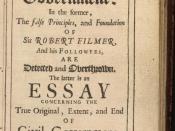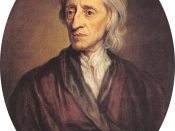Liberalism - an ideology born in the philosophical revolution to advance equality and individual liberty
The origin of the political ideology that found its name in nineteenth century Spain -Liberales - is found much earlier as a philosophical response to the individual restrictions of medieval Europe (Ball & Dagger, 43). The majority of people living in Europe were controlled by the Catholic Church as "religious and political authorities joined forces to ensure conformity to the doctrines of the Roman Church" (Ball & Dagger, 48). "As feudal relationships were passed down the generations" (Ball & Dagger, 49) individual social as well as religious freedoms were severely restricted among the common people. At the end of the Renaissance, in 1521, the Catholic Church chose to excommunicate Martin Luther for publicizing the ninety-five theses and the Protestant Reformation began (Ball & Dagger, 50). Soon to follow King Henry VIII of England separated the Church of England from Rome and the movement to reform the Roman Church and rid individuals of "the constraints of religious conformity" (Ball & Dagger, 52) unwittingly opened the door for the Liberalist Ideology.
The four basic elements of Liberalism are:
An explanation of the ideology of Liberalism is found in the relationship of the individual and the surrounding political, economic, and social environment in which the individual exists. Liberalism as a political ideology supports the right of the individual to formulate a government that protects the freedom of the individual to take action and to choose the conditions that define their society. Because economic, political, and social conditions change through time it is the individuals responsibility to shape the aspects of its society to adjust to the evolving challenges that arise to its welfare (Ball & Dagger, 84)
When Liberalism is evaluated, it is against the opportunity of the...


